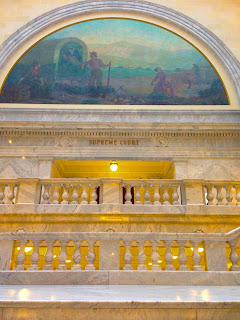15 members
No required minimum age
4 year terms
Elected by the voters of their district (sort of)
Meet 11 times a year to conduct business
4 year terms
Elected by the voters of their district (sort of)
Meet 11 times a year to conduct business
1. WHAT IS THE SITUATION?
- The Utah Supreme Court issued a ruling that tells us that the current process in which we elect state school board members is unconstitutional
- We have an upcoming election (2016), in which these positions are up for election
- We have no constitutional remedy in place
- On Nov 3, 2015 the Governor announced that he would not assemble the Nominating and Recruiting committee because the courts ruled it unconstitutional
2. HOW DID WE GET HERE?
- Judge Waddoups’ ruling says our selection process isn’t constitutional because it violates the free speech of the applicants
- Applicants must censor selves in the interview process in order to get on ballot
- Voters should determine what that evaluation process should be
- Current election process
- Governor assembles Nominating and Recruiting Committee
- Assembled by the November 1st before a general election
- 12 members
- 2 year term
- Represents 6 different industry areas
- Manufacturing and mining
- Transportation and public utilities
- Service, trade and IT
- Finance, Insurance and real estate
- Construction
- Agriculture
- 6 different education areas
- Teachers
- School administrators
- Parents
- Local school board members
- Charter schools
- Higher education
- Review Committee advances a minimum of 3 and maximum of 5 candidates per board seat to governor
- Governor narrows it down to 2 who get listed on the ballot for voters to decide winner
- The only required criteria
- Candidates possess “outstanding professional qualifications relating to the powers and duties of the State Board of Education,” including experience in:
- A multitude of business and industry areas
- Higher education or public education administration
- Applied technology education
- Public education instruction
- Economic Development
- Other life experiences that would benefit the board
- 70 people filed for candidacy - 37 candidates were selected by the committee for interviews - a handful of people who didn't advance forward, sued
- Ruling says the requirements are too broad
- Applicants’ free speech rights cannot be subjected to self-censorship because they are fearful that their beliefs and speech will offend the gatekeepers and deny them ballot placement
- The school board is an elected position, not an appointive position
- The voters should be the gatekeepers and can apply their own evaluation rules and standards
- Judge did not issue a remedy
- Some candidates who weren't advanced to the Governor for consideration requested that the remedy be to place them on the ballot; but no remedy for the process was put into place
3. HISTORY OF THE ELECTION PROCESS
- State Board of Education was created by the Utah Constitution, which allows the Legislature to determine election process
- “Membership of the board shall be established and elected as provided by statute”
- State initially had non-partisan elections
- In 1992, the election process was changed to incorporate regional committees that interviewed and narrowed candidates down to 3-5, who were recommended to Governor. Governor then picked two to be on the ballot.
- In 2002, the election process changed again, to establish one state committee, rather than regional committees
- Equally comprised of education representation and business and industry representation
4. PROPOSED SOLUTIONS
2015 General Session
proposals:
o
Non-partisan Elections: HB186, State School Board Membership and Election
Amendments: Creates a direct
nonpartisan election for the state school board, requiring candidates to gather
signatures from residents in their area in order to appear on the ballot.
o
Partisan Elections: SB104, Education Elections and Reporting Amendments: Eliminates the nominating committee and requires candidates for
state and local school boards to participate in a partisan school board election.
o
Governor Appointment: HJR16, Proposal to Amend Utah Constitution - Governance of
Public Education: Amends the constitution to
require that all state school board seats be appointed by the governor and
confirmed by the Senate.
The House sent over to the
Senate HB186, a nonpartisan election bill which was hijacked and inserted
with language that made it partisan, before going to the ballot for the
public to decide if it should be governor appointed. SJR5 was also sent over in an effort to get it on a ballot for a
constitutional amendment. All proposals failed and the 2015 General Session ended with no legislative solution. The Government Operations Interim Committee was assigned the task of developing a viable proposal.
o Board shrinks from 15 to 13
§
4 partisan
§
4 non-partisan
§
5 appointed by Gov and
confirmed by Senate
o Seats based on 4 congressional districts
o Voters in each district gets represented by 1 partisan, 1
non-partisan, and 1 appointed
o Proposal would go to voters as a proposition on the ballot
The interim proposal did not move forward as a committee bill.
5. WHAT NOW? REVIEW CURRENT GENERAL PROPOSAL
The most current proposal is to modify the current process so that it is constitutional. This is an option that will at least get us through the next election cycle, while the Legislature reviews and revisits other options.
The Governor must call the Legislature into a special session to address the issue in order to have a process in place for the upcoming election cycle. The ideal time to have a special session would have been during this November interim period (Nov 18-20), since all of the members are in town and it is the last interim of the year (no interim meetings are held in December). There have been talks of convening a special session before the general session, but nothing confirmed at this point in time.

